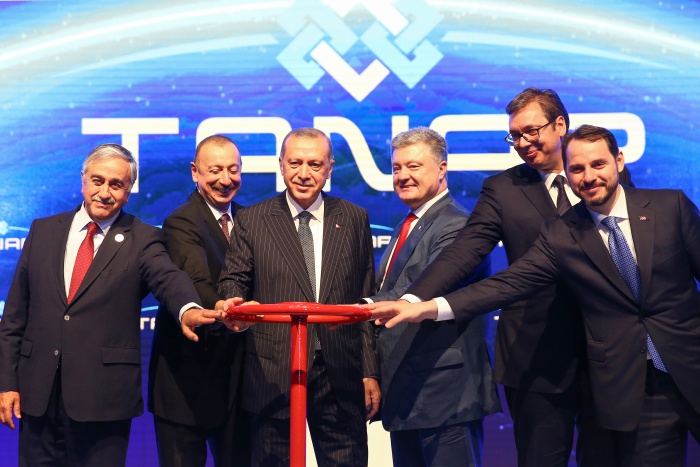Fatih Yurtsever*
The Trans-Anatolian Natural Gas Pipeline (TANAP) project began with the signing of an agreement between Turkey and Azerbaijan on June 26, 2012 to transport natural gas produced from the Shah Deniz-2 field in the Caspian Sea to Turkey and Europe. Under the TANAP agreement, 10 billion cubic meters (bcm) of natural gas to Europe and 6 bcm to Turkey were to be be transported annually. On July 19, 2022, a memorandum of understanding (MOU) was signed by the EU and Azerbaijan to double the amount of gas transported to Europe through TANAP to 20 bcm to reduce the EU’s dependence on Russian gas. Now, who is the operator of the Shah Deniz-2 field? Is the EU really moving away from Russian gas? And what has Turkey lost through the TANAP project?
According to an agreement signed with Azerbaijan in 2001, Turkey has been receiving natural gas from Azerbaijan through the Baku-Tbilisi-Erzurum pipeline since 2007. Turkey accepts this gas at the Georgian border and distributes it within the country through the national pipeline, which belongs to the Petroleum Pipeline Corporation (BOTAŞ).
In 2012 the TANAP project was launched to meet Turkey’s increasing natural gas demand and to diversify the natural gas sources of EU countries. Within the scope of the TANAP project, the decision was made to build a new pipeline instead of using Turkey’s existing pipelines for gas to be transported to both Turkey and Europe. In other words, Turkey agreed to create a new pipeline under the TANAP project, even though it has had a pipeline for receiving gas from Azerbaijan since 2007. This pipeline could also be used to transport gas to Europe.
TANAP currently has a capacity of 16 bcm, which can be increased to a maximum of 32 bcm. Gas for TANAP is supplied from the Shah Deniz-2 field, which is operated by an international consortium, the member companies of which and their shares until recently were: BP-UK (28.8 percent); TPAO-Turkey (19 percent); SOCAR-Azerbaijan (16.7 percent); Petronas-Malaysia (15.5 percent); Lukoil-Russia (10 percent); and NIOC-Iran (10 percent). However, at the end of 2021, Lukoil bought all Petronas shares and increased its stake to 25.5 percent. (The shares of Petronas-Malaysia allegedly belonged to Turkish President Recep Tayyip Erdoğan. Lukoil bought the Petronas shares under a decision taken during a September 2021 meeting between Russian President Vladimir Putin and Erdoğan in Sochi.)
The TANAP pipeline, which starts at the Turkey-Georgia border and ends in Edirne at the Greek border, was built by Tekfen Construction, a company close to President Erdoğan. This pipeline is also operated by an international consortium (SOCAR, 60 percent; BOTAŞ, 30 percent; and BP, 10 percent). As part of the TANAP project, Turkey buys natural gas from Shah Deniz-2 at 88 percent of the Russian gas price. However, since the natural gas purchased is transported by a pipeline built by the consortium instead of national pipelines, transit fees are added to the price. For every 1,000 m³ of natural gas, a transit fee of $79 is paid for transportation to Eskişehir, the first exit point, and $109 to Thrace, making the gas Turkey buys from Azerbaijan quite expensive.
However, there is another critical point here. If Turkey had transported the gas from Shah Deniz-2 to Europe through its own pipeline rather than through TANAP, it would not have had to pay a transportation fee for the gas it purchased and would have received a transit fee for the gas going to Europe.
With the recent MOU between the EU and Azerbaijan, the amount of gas transported to Europe under TANAP will increase to 20 bcm. Moreover, the EU claims it is buying this gas to reduce its dependence on Russian gas. However, 25.5 percent of the gas resources of TANAP’s Shah Deniz-2 field belong to the Russian Lukoil company.
Consequently, Turkey could have met its own needs without TANAP by increasing the gas it has been receiving from Azerbaijan through its pipelines since 2007. From this point of view, TANAP is not a project that serves Turkey’s interests. The winners of this project are businessmen like Sıtkı Ayan, who is close to Erdoğan and who built the TANAP pipeline. For the EU, the TANAP project is not a solution at a time when it wants to end its dependence on Russia for natural gas. After all, a quarter of the gas delivered to the EU under TANAP belongs to Russia. So, thanks to Erdoğan and Aliyev, Russia continues to sell its gas to Europe.
* Fatih Yurtsever is a former naval officer in the Turkish Armed Forces. He is using a pseudonym out of security concerns.


